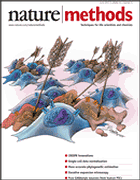|
Literature / Source Database:
Nature Methods
Description
techniques for life scientists and chemists
| Title (short) |
Nat. Methods |
| Languages |
English |
| First year |
2004 |
| Impact factor |
25.062 |
|
|

|
Status
active
Subject

Source type
Journal
ISBN ISSN
1548-7091
E ISSN
1548-7105
First volume
1
Last volume
14
Publish city
New York
Homepage
| Resources |
|
Availability |
|
|
|
|
|
| Text PDF |
 |
free access |
 |
| Text Html |
 |
for subscriber |
 |
| References |
 |
not available |
 |
| Abstracts |
 |
|
|
| TOC |
 |
|
|
|
|
|
|

Description
Nature Methods is a forum for the publication of novel methods and significant improvements to tried-and-tested basic research techniques in the life sciences. This monthly publication is aimed at a broad, interdisciplinary audience of academic and industry researchers actively involved in laboratory practice. It provides them with new tools to conduct their research and places a strong emphasis on the immediate practical relevance of the work presented. The journal publishes primary research papers as well as overviews of recent technical and methodological developments. We are actively seeking primary methods papers of relevance to the biological and biomedical sciences, including methods grounded in chemistry that have a practical application to the study of biological problems. To enhance the practical relevance of each paper, description of the method must be accompanied by its validation, its application to an important biological question and results illustrating its performance in comparison to available approaches. Articles are selected for publication that present broad interest, thorough assessments of methodological performance and comprehensive technical descriptions that facilitate immediate application. Specific areas of interest include, but are not limited to: - Methods for nucleic acid manipulation, amplification and sequencing
- Methods for protein engineering, expression and purification
- Methods for proteomics, including mass spectrometry, analysis of binding interactions, microarray-based technologies, display techniques, analysis of post-translational modifications, glycobiology and metabolomics
- Methods for systems biology, including proteomics approaches, protein interaction analysis methods and genome wide expression and regulation profiling
- Biomolecular structural analysis technologies, including NMR and crystallography
- Chemical biology techniques, including chemical labeling, methods for expanding the genetic code and directed evolution
- Biophysical methods, including single molecule and lab-on-a-chip technologies
- Optical and non-optical imaging technologies, including probe design and labeling methods, microscopy, spectroscopy and in vivo imaging
- Techniques for the analysis and manipulation of gene expression, including epigenetics, gene targeting, transduction, RNA interference and microarray-based technologies
- Methods for cell culture and manipulation, including stem cells, single cell methods and lab-on-a-chip technologies
- Immunological techniques, including production of antibodies, antibody-based assays and immunolabeling
- Methods for the study of physiology and disease processes including cancer
- Methods involving model organisms and their manipulation and phenotyping
- Computational and bioinformatic methods for analysis, modeling or visualization of biological data
- Nanotechnology-based methods applied to basic biology
|